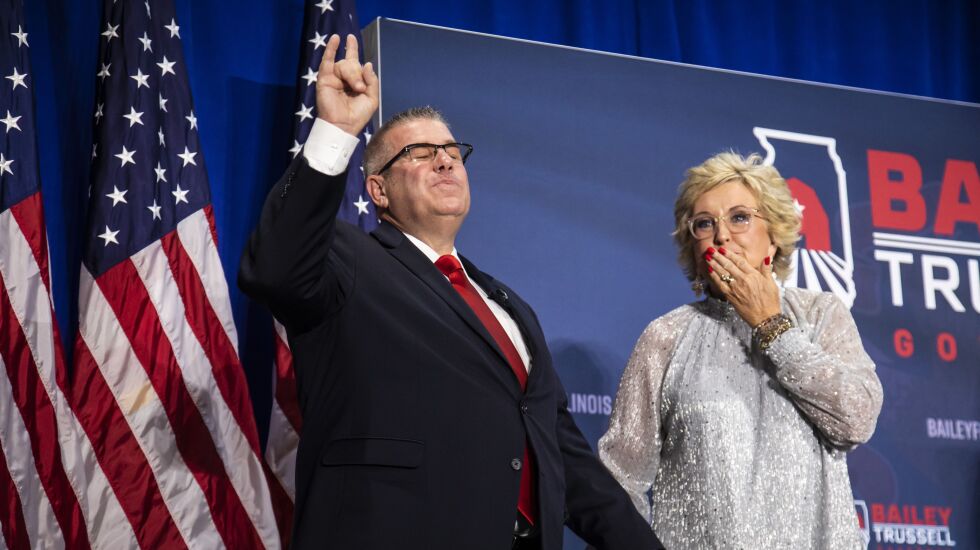
Funding primary candidates from another party with the intent to set them up for a loss in the general election undermines the American idea of democracy.
An example of this trending political strategy will be at the top of the Illinois November ballot: Gov. J.B. Pritzker vs. state Sen. Darren Bailey.
The ploy began a few months back when the Democratic Governors Association and Pritzker began investing millions of dollars through advertisements boosting Bailey’s views — bringing more eyes on the Donald Trump-endorsed state senator than the more moderate Aurora Mayor Richard Irvin, who had $50 million in donations on his side and dubbed himself as “Pritzker’s worst nightmare.”
Pritzker got what he wanted when Bailey won the Republican nomination for governor in the June primary. Now it’s up to the voters to decide between him and a candidate who is anti-abortion, pro-guns and known for wanting Trump’s approval.
“I’m running a campaign to get Democrats elected and to beat Republicans,” the governor said when asked by the Sun-Times whether helping the primary campaign of a conservative Republican could backfire. “And I want people to know what we believe in and what they believe in. And so, the messages that I’ve talked about on TV are all messages about amplifying the differences between Democrats and Republicans.”
This tactic is not illegal, and candidates have been transparent about their intentions, as it is a requirement for political advertisements. But using money to deliberately subvert an opposing party’s nomination process is unacceptable.
No matter what side you’re on, voters deserve to choose between candidates who represent them best. That will get harder and harder to achieve if this tactic picks up steam in future elections.
Inception of the strategy
Democrats who have partaken in funding a Republican candidate say the reverse psychology investment ups their chances to keep their seats blue. Political strategists have even called it a brilliant move, spending $1 million on a candidate with low chances rather than spending $20 million against a tougher competitor.
The modern-day political gamble can be traced back to a 2012 Missouri election where former U.S. Senator Claire McCaskill strategically measured her competition and singled out the underdog.
“There were three viable candidates, and Todd Akin was kind of the weirdest one,” McCaskill told NPR. “I knew he might say some weird things if he were nominated. And he had less money, so we took a poll and figured out what Republican voters would really like about him.”
In the weeks leading up to the primary, McCaskill put her own money into boosting Akin, more than what he had spent in his entire campaign. He won the Republican nomination - and lost to McCaskill in the general election.
Although McCaskill was successful 10 years ago, she warns Democrats hoping to repeat her strategy today could face tougher odds, especially when going against a Trump Republican.
Mixed results
Results could be 50-50 when Trump is in the mix, as a Sun-Times/WBEZ poll found in early June. Out of 677 likely Republican primary voters, 52% of respondents said they were more likely to vote for a candidate who supported Trump, according to the poll.
Leading up to this year’s Pennsylvania primary, Democratic gubernatorial nominee Josh Shapiro spent hundreds of thousands of dollars on TV advertisements boosting GOP primary candidate Doug Mastriano, who is under investigation by the House Jan. 6th Committee. He secured a spot on the general election by winning the Republican nomination.
The same was attempted in California when a political action committee linked to Democratic House Speaker Nancy Pelosi targeted conservative candidate Chris Mathys. In that case, the effort did not pay off as Mathys ended up losing the Republican nomination for the state’s 22nd Congressional District.
Democratic values
Come November, Illinois voters will have to choose between Pritzker and an opponent Pritzker helped win. That doesn’t feel right, and it shouldn’t.
It doesn’t matter if candidates are trying to keep a political seat blue or red. Influencing elections by funding and boosting weaker opponents pollutes the nature of our democracy.
Keep it clean. The power to choose representatives must stay with the voters.
Want to write a letter to the editor or submit an op-ed for the Sun-Times? See our guidelines.







